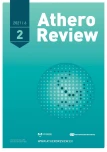New alirocumab dosing regimen: 300 mg every 4 weeks
Authors:
Petr Ošťádal
Authors‘ workplace:
Komplexní kardiovaskulární centrum, Nemocnice Na Homolce, Praha
Published in:
AtheroRev 2021; 6(2): 103-107
Category:
Overview
The proprotein convertase subtilisin kexin type 9 inhibitor (PCSK9) alirocumab has been used in the lipid-lowering therapy as a 75mg or 150mg subcutaneous injection given every 2 weeks. Currently, alirocumab is available also as a single 300mg injection for administration every 4 weeks. This dosing regimen is supported by clinical studies that have evaluated its pharmacodynamic profile, efficacy, safety and also technical aspects of the newly developed autoinjector. Present article summarizes the available evidence for treatment with alirocoumab 300mg every 4 weeks.
Keywords:
alirocumab – dosing regimen – proprotein convertase subtilisin kexin type 9 (PCSK9)
Sources
1. Sabatine MS, Giugliano RP, Keech AC et al. Evolocumab and Clinical Outcomes in Patients with Cardiovascular Disease. N Engl J Med 2017; 376(18): 1713–1722. Dostupné z DOI: .
2. Schwartz GG, Steg PG, Szarek M et al. Alirocumab and Cardiovascular Outcomes after Acute Coronary Syndrome. N Engl J Med 2018; 379(22): 2097–2107. Dostupné z DOI: .
3. McKenney JM, Koren MJ, Kereiakes DJ et al. Safety and efficacy of a monoclonal antibody to proprotein convertase subtilisin/kexin type 9 serine protease, SAR236553/REGN727, in patients with primary hypercholesterolemia receiving ongoing stable atorvastatin therapy. J Am Coll Cardiol 2012; 59(25): 2344–2353. Dostupné z DOI: .
4. Stein EA, Gipe D, Bergeron J et al. Effect of a monoclonal antibody to PCSK9, REGN727/SAR236553, to reduce low-density lipoprotein cholesterol in patients with heterozygous familial hypercholesterolaemia on stable statin dose with or without ezetimibe therapy: a phase 2 randomised controlled trial. Lancet 2012; 380(9836): 29–36. Dostupné z DOI: .
5. Li H, Wei Y, Yang Z et al. Safety, Tolerability, Pharmacokinetics, and Pharmacodynamics of Alirocumab in Healthy Chinese Subjects: A Randomized, Double-Blind, Placebo-Controlled, Ascending Single-Dose Study. Am J Cardiovasc Drugs 2020; 20(5): 489–503. Dostupné z DOI: .
6. Roth EM, Moriarty PM, Bergeron J et al. A phase III randomized trial evaluating alirocumab 300 mg every 4 weeks as monotherapy or add-on to statin: ODYSSEY CHOICE I. Atherosclerosis 2016; 254 : 254–262. Dostupné z DOI: .
7. Roth EM, Kastelein JJP, Cannon CP et al. Pharmacodynamic relationship between PCSK9, alirocumab, and LDL-C lowering in the ODYSSEY CHOICE I trial. J Clin Lipidol 2020; 14(5): 707–719. Dostupné z DOI: .
8. Frias JP, Koren MJ, Loizeau V et al. The SYDNEY Device Study: A Multicenter, Randomized, Open-label Usability Study of a 2-mL Alirocumab Autoinjector Device. Clin Ther 2020; 42(1): 94–107.e5. Dostupné z DOI: .
Labels
Angiology Diabetology Internal medicine Cardiology General practitioner for adultsArticle was published in
Athero Review

2021 Issue 2
- Advances in the Treatment of Myasthenia Gravis on the Horizon
- Memantine Eases Daily Life for Patients and Caregivers
- Memantine in Dementia Therapy – Current Findings and Possible Future Applications
- Possibilities of Using Metamizole in the Treatment of Acute Primary Headaches
- Metamizole vs. Tramadol in Postoperative Analgesia
-
All articles in this issue
- EDITORIAL
- Hypolipidemic treatment improves the prognosis of diabetics. Why do we use it so modestly?
- Insulin resistance and its targeting in clinical practice
- SGLT2 inhibitors and atherosclerosis in a background of effect of gliflozins and heart failure
- The LDL number is alive!
- Atherosclerosis – indicator for treatment of patient with type 2 diabetes mellitus
- Residual inflammatory cardiovascular risk – diagnostic and therapeutic challenge
- Physical activity in treatment and prevention with a focus on risk factors for cardiovascular disease
- New alirocumab dosing regimen: 300 mg every 4 weeks
- Research on remarkable articles from international literature
- 24. virtuálny kongres XI. škola lipidológie a XXIX. nové trendy v prevencii aterosklerózy 2021
- Athero Review
- Journal archive
- Current issue
- About the journal
Most read in this issue
- Physical activity in treatment and prevention with a focus on risk factors for cardiovascular disease
- Insulin resistance and its targeting in clinical practice
- SGLT2 inhibitors and atherosclerosis in a background of effect of gliflozins and heart failure
- The LDL number is alive!
